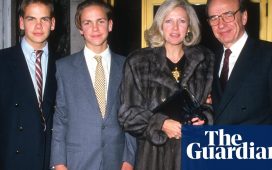The week I came back to work after parental leave, my daughter decided she didn’t want to sleep. My husband was on a work trip, and I was waking up every hour and a half to go through the long list of things she could possibly need – whether it was milk, a diaper change, a cuddle or an extra layer of clothing.
On the third morning, I found myself attempting to run our early breaking news operation while feeding my five-month-old, desperately in need of a shower and coffee. My mother, who had come to help for a few days, waited to take over.
This was not the hard part, but it was the bleary-eyed setting for which the hard part would come.
Days before I returned to work, the Ukraine war had begun. The week I sat at my desk for the first time in months, photos of children’s bodies in Bucha flooded my screen. Still raw from the physical wounds of birth and the emotional rollercoaster of learning to keep my baby alive, I worked through tears as I figured out which newswires we would run, which stories should take precedence, and whose suffering mattered most that day.
It’s different as a mother, I knew instantly. I’ve always been sensitive – soft, even – in the face of my work. Interviews replay in my mind for months; writing difficult stories sends me into a dark place. And yet, though empathy is not specific to parents, this is my new, fresh layer of vulnerability. I think of children lost to war, children lost to viruses, children lost to mass shootings, children who became adults and then were lost to police violence. Then I think of the mothers – mothers who spent those harrowing hours bringing children into this world and then lost them.
In my new world, I see every photo or video and think: someone worked so hard to keep this person alive. Someone woke up every hour to feed this baby, to soothe her to sleep, to watch her every breath when she had her first fever. It doesn’t matter where the child was born, or to whom. When Tyre Nichols was killed, my husband sent me an article about his last moments. “I think it’s profound that in so many of these situations, people are calling out for their moms,” he said. I pictured his mother, RowVaughn Wells, and thought: I’m so sorry you couldn’t get to your baby.
Science and lore both claim that a mother’s brain is physically changed when she has a baby. The amygdala becomes attuned to your baby’s needs, and the crying is louder, the affection stronger, the smell of your baby sweeter. This new brain activity, along with – for lack of a better term – raging hormones, created a new self, a new me. My body was always ready to react, to jump up and run to her side. Instead of savoring a few hours of sleep, I would stay awake looking up things that could go wrong and how to avoid them.

Less clear is how your brain reacts to other people’s children, but some data shows that a parent’s new empathy for their baby extends to external stimuli as well. We also know that humans tend to extend their empathy to people they can relate to – whether it’s people who have undergone similar experiences, or those who look or seem more like them.
This seems self-serving – that we care more about people who remind us of us. But the science belies a more universal truth. “There is no hierarchy of suffering,” the psychologist and Holocaust survivor Edith Eger is known for saying. I believe there is another layer: there is no hierarchy of empathy. Being a mother does not make me inherently more empathetic than someone who didn’t give birth, nor does it mean I somehow know how to act in the face of the pain that so acutely affects me now. There are different angles from which we access the empathy we apply to the world.
Within the context of my own life, this is now mine: I witness the brutality of the daily news cycle against the soft and warm sweetness of my now toddler’s bedtime ritual.
As I edit a news story about Nichols, read the news about teenagers losing their lives to gun violence in my city, or plan an article about lawmakers choosing not to give families with poor children money, I wonder what to do with the way I now look at the world. Does it mean these stories of loss and suffering are too sharp and painful to be cast on thousands of people every morning, or that we need to spend more time with more people, attempting to capture their life piece by piece, in the public eye? Does it mean that I should do what many of my friends outside the media world tell me they’ve started doing – stop watching the news?
For now, 15 months after becoming a parent, I’ve chosen not to decide, and let myself be changed. I know there may not be any benefit to feeling everything, but it’s certainly better than feeling nothing. And eventually, maybe I can share this with my daughter and tell her that bringing her into the world taught me more about the work I do, the humanity I aim to distill into words, than perhaps anything else I’ve done.










